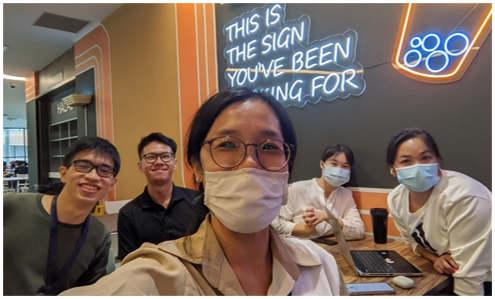In July, NUS staff put their digital skills to the test at the inaugural
DE’Hackathon, leveraging Digital Enablement (DE) tools and technology to address challenges, experiment with new ideas, and transform work processes.
Organised by NUS Information Technology, the event is part of NUS IT’s ambitions to equip NUS employees with the digital skills required by the workforce of the future. Since 2019, more than 5000 staff members have benefitted from the department’s Digital Enablement programme, receiving training and briefing on tools for Robotic Process Automation (RPA), forms & flow, data visualisation, visual collaboration, survey administration, web publishing and many more.
To facilitate cross-department collaboration, teams registering for the hackathon were required to pull together 3-5 NUS staff from at least two different NUS schools, faculties, departments or centres. In addition, teams had to make use of a minimum of two DE tools in their solutions.
A total of 12 teams from 18 NUS departments signed up for the challenge. The participating teams were invited to a pre-Hackathon briefing on 22 June, before participating in a four-day hacking session from 25 to 28 July. Throughout the hackathon, teams documented their progress and learning on team blogs. The event concluded on 29 July, with teams pitching their solutions to a live audience at the Auditorium at University Hall.
Ms Tan Shui-Min, Chief Information Technology Officer, commended the teams for their work. “[They] started as being digitally aware, then trained, and now [they’re] digitally fluent because [they’ve] reached an expert level through this hackathon. I’m proud to say that all [their] solutions, when added together, amount to 5000 man-days [in savings]!”
Evaluated on the merits of look and feel, innovativeness, estimated cost/time savings, and impact, the teams competed over two rounds, impressing the judges with their creativity and collaborative efforts. Presented solutions highlighted the diverse ways digital tools could be applied within NUS, and these ranged from aiding management of student reinstatement records at the Registrar's Office (RO) to enhancing the user experience and productivity in the NUS enterprise-wide cloud assessment process through increased automation.
The event concluded in the afternoon with the announcement of the following winners.
|
Winner: ComAct
 ComAct (from left): Shwe Zin Nyunt (ODPRT), Jet Lim (NUS IT), Richard Wibisono (NUS IT) ComAct (from left): Shwe Zin Nyunt (ODPRT), Jet Lim (NUS IT), Richard Wibisono (NUS IT)
One goal of the Singapore Health District programme is to engage ageing residents through Purposeful Activities (PA) for a meaningful and better-quality life. ComAct leveraged digital enablement tools such as Qualtrics for survey data collection, and Power Automate to download data, register and send survey respondent invitations. They also used Power BI to provide insights of survey data and extracted residents’ interest grouping to simplify the PA membership sign-up process, improving productivity, efficiency, and data accuracy.
|
|
1st Runner Up: Team Enablers
 Team Enablers (from left): Hong Xian Zheng (CDE), Michael Polim (NUS IT), Liu Ching Man (NUS Medicine), Zhou Chuanbei (NUS IT), Canny Chow (NUS Medicine) Team Enablers (from left): Hong Xian Zheng (CDE), Michael Polim (NUS IT), Liu Ching Man (NUS Medicine), Zhou Chuanbei (NUS IT), Canny Chow (NUS Medicine)
Curriculum planning and assessment at NUS often includes multiple, unintegrated platforms with varying data storage conventions, as well as repetitive and tedious manual work. Team Enablers developed two solutions to address these issues, one that utilised Microsoft Power Apps to capture data required for centralised timetable planning and Power BI to provide data insights, and the other that employed RPA to automate the downloading, processing and uploading of grades across numerous platforms.
|
|
2nd Runner Up: WeCare
 WeCare (from left): Dr Cyrus Ho (NUS Medicine), Mariz Pineda (NUS IT), Cherine Fok (NUS Medicine), Mak Hon Kiat (NUS IT), Mohammad Nashrulhaq (NUS IT) (not in photo) WeCare (from left): Dr Cyrus Ho (NUS Medicine), Mariz Pineda (NUS IT), Cherine Fok (NUS Medicine), Mak Hon Kiat (NUS IT), Mohammad Nashrulhaq (NUS IT) (not in photo)
The team developed “MyAwareness,” a mobile game for the NUS community that aimed to improve mental health literacy, nurture empathy, de-stigmatise mental health issues and provide mental health resources. Built around common, real-life scenarios, the story-based game requires players to choose their own avatar, make decisions which will result in different scenarios further in the game, and reflect on their own emotions and thoughts. WeCare leveraged digital enablement tools such as Miro for brainstorming and collaboration, MS Form to capture users’ sentiments and feedback, Power BI to visualise the data and Adobe Creative Cloud to create storyboard and illustrations.
|
Providing the closing remarks, the Guest-of-Honour, NUS President Professor Tan Eng Chye, applauded NUS IT for organising the DE’Hackathon and noted the role of the Digital Enablement initiative in NUS’ strategy for professional development and digital transformation. In addition, he highlighted the relevance of each of the three proposals to the University, praising participants for reaching beyond their units to connect, collaborate and develop innovative solutions.
“The University is a huge organisation and we have talented people all across. To leverage on our capabilities and shine beyond what we are doing now, we must work across departments and tap on expertise from others. I’m glad this hackathon facilitates that and I’m very amazed by what you all have accomplished,” said the President.